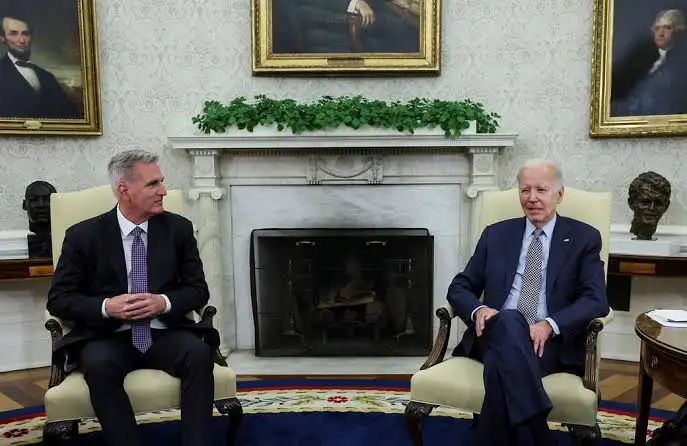President Joe Biden and top congressional Republican Kevin McCarthy have reportedly reached a tentative deal to raise the federal government’s debt ceiling, bringing an end to a months-long stalemate. The agreement, which was reached in a 90-minute phone call between the two leaders, aims to avert a potentially catastrophic default if passed through Congress in time. The Treasury Department had warned that the government would run out of money to cover its obligations by June 5 if the debt ceiling was not raised.
The deal comes after extensive negotiations, with Republicans pushing for spending cuts and other conditions to slow the growth of the US debt, which currently equals the annual output of the country’s economy. While exact details of the agreement are yet to be disclosed, sources have indicated that non-defense discretionary spending will be capped at 2023 levels for two years in exchange for a debt ceiling increase over a similar period.
The negotiation process has been crucial due to the narrow divide in Congress. The House of Representatives holds a Republican majority of 222-213, while the Senate is narrowly divided with a 51-49 Democratic majority. Finding a compromise that can clear both chambers has been challenging, and failure to do so would have severe consequences. The prolonged standoff has already spooked financial markets, leading to stock market declines and record-high interest rates for some bond sales. Economists warn that a default would likely trigger a recession, impact the global economy, and result in a spike in unemployment.
Previously, President Biden had refused to negotiate with McCarthy, insisting on a “clean” debt-ceiling increase without additional conditions. However, negotiations between the two leaders began on May 16, marking a shift in approach. Democrats accused Republicans of playing a dangerous game with the economy, while Republicans argued that increased government spending was contributing to the growing debt.
This situation brings back memories of the 2011 debt ceiling crisis when the nation also faced a similar situation with a Democratic president, a Democratic Senate, and a Republican-led House. Although default was averted, it had significant repercussions, including the first-ever downgrade of the US credit rating and a major stock sell-off.
While this tentative deal is a significant step forward, the process is not yet complete. McCarthy has committed to giving House members 72 hours to review the legislation before bringing it to a vote. The bill will then face the challenge of garnering support from enough moderate members to overcome opposition from both hard-right Republicans and progressive Democrats. In the Senate, it will need at least nine Republican votes to succeed. The path forward includes multiple opportunities for potential delays and hurdles.
The agreement to raise the debt ceiling is seen as a critical development in averting a potential economic crisis. However, the final passage of the bill through Congress remains uncertain, and its details will shape the impact on the nation’s finances and economy.


